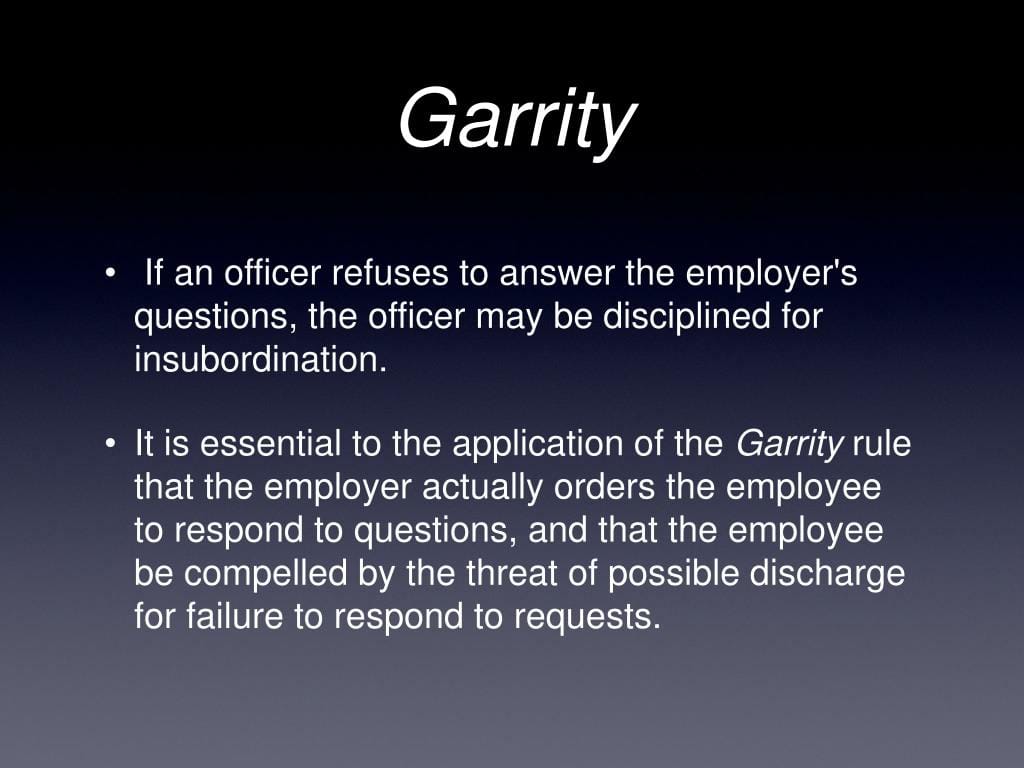This guide provides a comprehensive overview of Garrity Warnings, crucial for public employees navigating internal investigations. Understanding your rights is paramount, and this guide will equip you with the knowledge to confidently handle such situations.
Decoding the Garrity Warning
Working in the public sector offers unique protections, especially during internal investigations. The Garrity Warning is one such protection, acting as a safeguard against self-incrimination. However, understanding its nuances is essential for both employees and employers.
What is a Garrity Warning?
Imagine being questioned by your supervisor about a workplace incident. Before formal questioning begins, they issue a Garrity Warning, informing you of your rights:
- Right to Remain Silent (Regarding Criminal Matters): You have the right to remain silent about anything that could implicate you in a criminal investigation. This mirrors the Miranda rights you hear about in law enforcement situations.
- Compelled Statements and Disciplinary Actions: Anything you do say can and likely will be used against you in disciplinary proceedings within your workplace. This could range from a written warning to termination.
Garrity vs. Miranda: Key Differences
While both relate to self-incrimination, Garrity and Miranda apply to distinct situations:
| Rights | Who’s Asking Questions | What are you protected from? | Can statements be used in disciplinary actions? |
|---|---|---|---|
| Miranda Rights | Law Enforcement | Self-incrimination in a criminal case | No |
| Garrity Rights | Employer | Self-incrimination in a criminal case stemming from statements made during an internal investigation | Yes |
Miranda rights protect you during interactions with law enforcement, while Garrity safeguards public employees during internal workplace investigations. Critically, statements compelled under Garrity can be used in disciplinary actions, a key difference from Miranda.
Kalkines Warnings: Additional Protection for Federal Employees
Federal employees have further protection under Kalkines Warnings. These allow them to refuse to answer questions that could incriminate them, even in administrative proceedings. However, the timing is crucial: a Kalkines Warning must be issued before any immunity is offered.
Navigating the Garrity Landscape: Advice for Public Employees
Facing an internal investigation can be daunting. Here’s some practical advice if you receive a Garrity Warning:
- Seek Legal Counsel: Consulting an attorney is paramount. They can help you understand your rights and navigate the complexities of the investigation.
- Strategic Silence: You have the right to remain silent on matters that could lead to criminal charges. However, refusing to cooperate with the internal investigation itself might have employment repercussions. This requires careful balancing with your legal counsel.
- Understand the Stakes: Cooperating is generally required, but anything you say can be used against you within your employment. This delicate balance requires careful consideration.
Responsibilities of Public Employers
Employers also have crucial responsibilities regarding Garrity:
- Meticulous Administration: Garrity Warnings must be delivered correctly and the entire process meticulously documented. Any procedural missteps can jeopardize the investigation.
- Strictly Administrative Use: Information obtained under Garrity is solely for administrative purposes, not criminal prosecution. This distinction is fundamental.
- Procedural Integrity: An improperly administered Garrity Warning can invalidate the entire investigation, potentially allowing misconduct to go unaddressed.
The Ethical Tightrope
Garrity Warnings present an ethical dilemma. Employers must investigate wrongdoing while respecting employee rights. Employees may feel pressured to answer, even if it jeopardizes their job. This ongoing debate regarding the fairness and effectiveness of Garrity underscores the need for careful navigation and expert legal advice. Don’t go it alone – seek guidance. [Looking for help optimizing your website content? Check out our guidey or learn more about our top-rated SEO tool, gpacs.]
Understanding the Meaning of Garrity
The term “Garrity” originates from the landmark 1967 Supreme Court case Garrity v. New Jersey. This case established crucial protections for public employees during internal investigations, ensuring their Fifth Amendment right against self-incrimination isn’t violated.
A Garrity Warning serves as a notification of these rights, informing employees of the following:
- Obligation to Answer: While seemingly contradictory, employees must answer questions under Garrity. Refusal can lead to disciplinary action. This is the “compulsion” element.
- Restricted Use of Statements: Answers can be used in internal disciplinary proceedings but cannot be used in separate criminal investigations. This is the core protection Garrity offers.
- Consequences of Non-Compliance: Refusal to answer can result in workplace consequences, from reprimands to termination.
Garrity vs. Miranda: Clarifying the Distinction
While both relate to self-incrimination, their application differs:
| Rights | Who’s Asking Questions | What are you protected from? |
|---|---|---|
| Miranda Rights | Law Enforcement | Self-incrimination in a criminal case |
| Garrity Rights | Employer | Self-incrimination in a criminal case stemming from statements made during an internal investigation |
Miranda rights protect you during law enforcement questioning, while Garrity safeguards public employees during employer-led workplace investigations. It’s important to note that Garrity isn’t a blanket immunity. While it protects against criminal use of compelled statements, those statements can still be used in internal disciplinary actions. The purpose of Garrity is to balance the employer’s need to investigate misconduct with the employee’s constitutional rights. Ongoing research and debate continue to shape the understanding and application of Garrity. Consulting with a legal professional is always advisable for specific situations.
Garrity Warnings in Wisconsin: A Specific Look
Wisconsin, like other states, applies Garrity, but with some nuances. While the core principle of protecting public employees from self-incrimination during internal investigations remains, Wisconsin might seem to apply a narrower interpretation of when a Garrity warning is strictly required.
Wisconsin’s Focus on Explicit Threats
Unlike some jurisdictions, Wisconsin generally mandates a Garrity Warning only when an employee faces a direct threat of job loss for refusing to answer questions. This stricter interpretation may create some ambiguity, but caution is advised.
Best Practice: Adhering to the Broader Seventh Circuit Standard
Legal experts recommend that Wisconsin public employers follow the broader Seventh Circuit standard, which considers the “totality of circumstances.” Even if termination isn’t explicitly threatened, if a reasonable employee would fear adverse consequences (demotion, suspension, etc.) for remaining silent, a Garrity Warning is considered necessary. This proactive approach is particularly important for school districts and other public entities to ensure compliance and protect employee rights.
Key Considerations in Wisconsin
Even with a Garrity Warning, dishonesty can result in charges like perjury. The protection only covers truthful answers. Here’s a breakdown:
| Scenario | Garrity Warning Likely Required in Wisconsin? | Why? |
|---|---|---|
| Direct threat of termination for silence | Yes | The employee is clearly being compelled to incriminate themselves under threat of job loss. |
| Implied threat of negative consequences | Probably | A prudent approach, aligning with the Seventh Circuit standard. |
| General questioning, no implied threat | Maybe | While not strictly required under Wisconsin’s narrower view, offering the warning is advisable. |
| Voluntary statement, no questioning | No | The employee is offering information freely, not under compulsion. |
The legal landscape surrounding Garrity is constantly evolving. Consulting a legal professional is crucial for navigating specific situations. [Need help with SEO? Explore our guidey or our SEO tool, gpacs.]
Garrity Rights in Florida: A Guide for Public Employees
Florida, like other states, upholds the principles of Garrity, protecting public employees from self-incrimination during internal investigations. However, understanding Florida’s specific application is crucial.
Understanding the Garrity Warning in Florida
The Garrity Warning in Florida serves the same fundamental purpose: to inform employees of their rights during questioning. It acknowledges the compelled nature of their statements and assures them these statements cannot be used against them in a criminal court. However, it’s essential to remember that these statements can be used in internal disciplinary proceedings.
When Garrity Applies in Florida
A Garrity Warning is required whenever an employee is compelled to answer questions under the implied or explicit threat of job loss or other serious professional consequences. Florida courts recognize that even the perception of a threat can trigger Garrity protections. This “implied threat” doctrine is a crucial nuance in Florida.
Key Features of Garrity in Florida
- Purpose: Protects public employees from self-incrimination during employer-led investigations.
- Scope: Applies to compelled statements made under threat of job loss or other substantial consequences. Voluntary statements or those made outside the formal investigation are generally not covered.
- Limitations: Does not protect against the use of compelled statements in internal disciplinary procedures.
- Employer’s Duty: Employers must provide Garrity Warnings when compelling potentially incriminating testimony.
- Consequences of Violation: Statements obtained in violation of Garrity are typically inadmissible in criminal proceedings.
Best Practices for Florida Public Employees
- Recognize Implied Threats: Even if your boss doesn’t explicitly mention Garrity, understand that the implied threat of job loss or discipline can trigger these protections.
- Consider a Garrity Statement: If a formal warning isn’t given, you can proactively assert your rights by providing a written Garrity Statement, explicitly stating that your answers are compelled and cannot be used against you in criminal proceedings.
- Seek Legal Counsel: Consulting an attorney is crucial to understand the nuances of Garrity in Florida and to protect your rights.
The legal interpretation of Garrity continues to evolve. Staying informed and seeking professional legal advice is always recommended. [Need help with your website’s SEO? Check out our comprehensive guidey or learn more about our SEO tool, gpacs.]
- Unveiling Bernhard Caesar Einstein’s Scientific Achievements: A Legacy in Engineering - July 15, 2025
- Uncover who is Jerry McSorley: CEO, Family Man, Business Success Story - July 15, 2025
- Discover Bernhard Caesar Einstein’s Scientific Contributions: Unveiling a Legacy Beyond Einstein - July 15, 2025
















1 thought on “Understanding the Garrity Warning: A Comprehensive Guide for Public Employees”
Comments are closed.